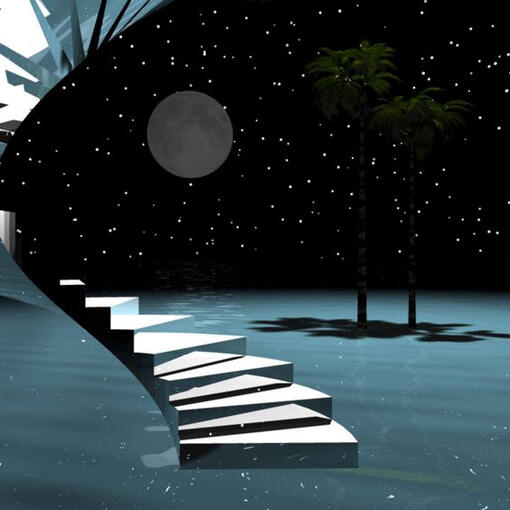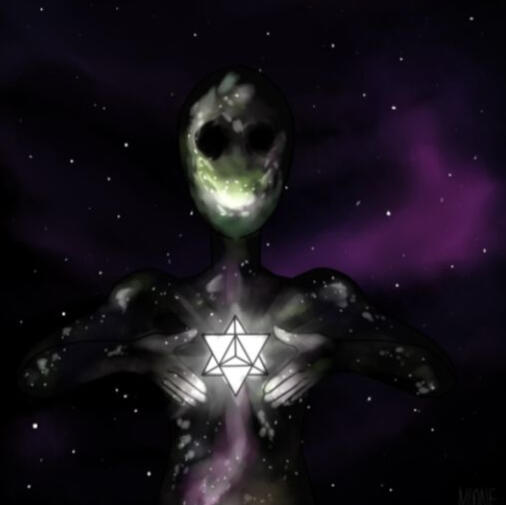After White Ball, a graceful and optimistic description of the afterlife, Stella is killed in Murders. This is reflected in the intense change of tone and the fast-paced, scattered, and sometimes nonsensical lyrics. Simon is not at all calm. Simon tries to explain the missing girl and his lack of involvement, frantically and at a rapid pace. The first chorus is interrupted when Simon starts explaining himself again in the second verse, as if he already knows that he is to be framed for murder. Later, Simon is able to finish singing the first refrain, "I was in the middle ground looking to find the fountain of infinite mirror" (Murders 18). In the last minute of the song, a solemn piano melody sets in, marked by regret and a lower intensity than at the beginning of the song. It slowly fades out, and the audience hears Simon almost repeat the first lyric, with much more pain in his heart than before: "I was in the forest looking to see the trees but none were there" (Murders 44).
Another significant shift in tone away from Murders, 宇宙ステーションのレベル7 (Space Station Level 7, English translation) represents Stella's arrival at her destination, Elysium. "Heaven!" is the only English word heard throughout the song. The rest of the song is in Japanese, and five lines of the bridge are in French. The use of French may seem unexpected, but it reinforces the connection to the main themes of the song.
In Paris, France, there is a famous avenue, the Champs-Élysées. Translated from French, the name means "Elysian Fields." The text of the French bridge also reflects a hopeful perspective on death, describing a "Jardin de l'imagination" ("garden of the imagination," English translation, Space 19) and recalling Introduction to the Snow with its final line, "tu vivras toujours ce soir" ("you'll live forever tonight," English translation, Space 22). This verse, which parallels the reference to omniscience in Introduction To The Snow, tells the audience that the event of the Stella's ascension into Elysium was preordained from the beginning. Simon's awareness of this is probably not as limited as it seems, because on the bridge of Space Station Level 7 space station it says "La galaxie s'étend" ("The galaxy expands," English translation, Space 18), which corresponds to the first line of Introduction to the Snow describing the edge of the universe.
These subtle allusions to Simon's self-awareness are even more consistently realised in the second half of Hawaii: Part II.
The Mind Electric follows closely behind and begins its unsettling mood by starting the song from its end and spinning back to the proper beginning of the song. This takes up the first half of the six minute and thirteen second song. Once the reversed version begins, Simon is speaking in front of a judge, trying to declare his innocence. Since all the evidence is against Simon, the judge does not believe him, so Simon pleads insanity.
He is committed to a mental institution and must undergo electroshock therapy. The endless suffering of this new life that Simon experiences is comparable to the descriptions of the hellish underworld (Tartarus) of the Greek afterlife and the punishment of sinners. Tartarus is described by many ancient writers, but according to Plato in his dialogue Gorgias, in which Socrates discusses the existence of Tartarus and the islands of the blessed. Socrates said, "Now in the days of Cronos there existed a law respecting the destiny of man, [...] that he who has lived unjustly and impiously shall go to the house of vengeance and punishment which is called Tartarus." (Plato 125). As a victim of agonising condemnation, Simon describes the imbalance of power between him and the figures who punish him as "Scorching out thine sovereignty" (tme 20).
As the eighth song on the album, Labyrinth takes a different path and jumps into a new style of music. With its 8-bit backing track, the vocals reflect the R&B genre as Simon sings about trying to escape a maze he's trapped in, while a female voice mockingly echoes through the song. Simon describes his situation as less than ideal: "Trying to escape from this thing that I fear / Everything seems clear like the end is near" (Labyrinth 6-7), while also expressing signs of self-doubt: "Maybe I finally reached the point of no return" (Labyrinth 17).
Simon also describes a beast chasing after him in this labyrinth, which is a clear allusion to Theseus from Plutarch, where Theseus enters the Labyrinth of Crete to defeat the Minotaur within. In Theseus, Theseus was sent into the labyrinth as one of the fourteen young tributes sacrificed to the Minotaur every nine years. Before entering the labyrinth, Theseus had fallen in love with King Minos' daughter, Ariadne. Ariadne gave him a "thread" to help him retrace his steps out of the labyrinth after he killed the beast inside. "When he arrived at Crete, [...] having a clue of thread given him by Ariadne, who had fallen in love with him, gave him a piece of thread, and being instructed by her how to use it so as to conduct him through the windings of the labyrinth, and he escaped out of it and slew the Minotaur, and sailed back, taking along with him Ariadne and the young Athenian captives." (Plutarch 97). Simon sees himself as Theseus, a strong hero, but adds his own delusions to defeat the predetermined story he is following, but which is not supposed to take place.
Similar to Labyrinth in musical composition, Time Machine adopts a more upbeat melody to distract from the sad feelings of the text. Simon experiences a time machine that takes him back in time to before he met the girl. His attempt to relive this love fails when the time machine breaks and the last verse repeats like a broken record.
Regardless, Time Machine does not reference a Greek myth or a piece of ancient history, but a connection can be made through tangential external media. Variations on a Cloud, a song made by ミラクルミュージカル (Miracle Musical, English translation) but not included on the official Hawaii: Part II, was originally listed as a "zeroth" track for viewers who pre-ordered a copy of Hawaii: Part II. The bridge of this song imitates another work by Joe Hawley & Ross Federman when they played in the band Tally Hall. Ruler of Everything, from Marvin's Marvelous Mechanical Museum (2005) by Tally Hall, is quoted near the end of Variations on a Cloud and only slightly paraphrased: "Do you like how my face has learned to tick like a clock? / I have a wonderful life, I know a powerful Bob / He eulogizes me for being geocentric" (voac 39-41), compared to "Do you like how my face disintegrates into chalk? / I have a wonderful wife, I have a powerful job / She criticizes me for being egocentric" (roe 17-19). This reference clearly connects the two songs in meaning, thus establishing a link between Ruler of Everything and its main concept and the main album of Miracle Musical.
Despite the contrasting themes, the resolutions of the two songs are similar in intent.
Simon realizes that time cannot be defeated no matter how hard he tries.




